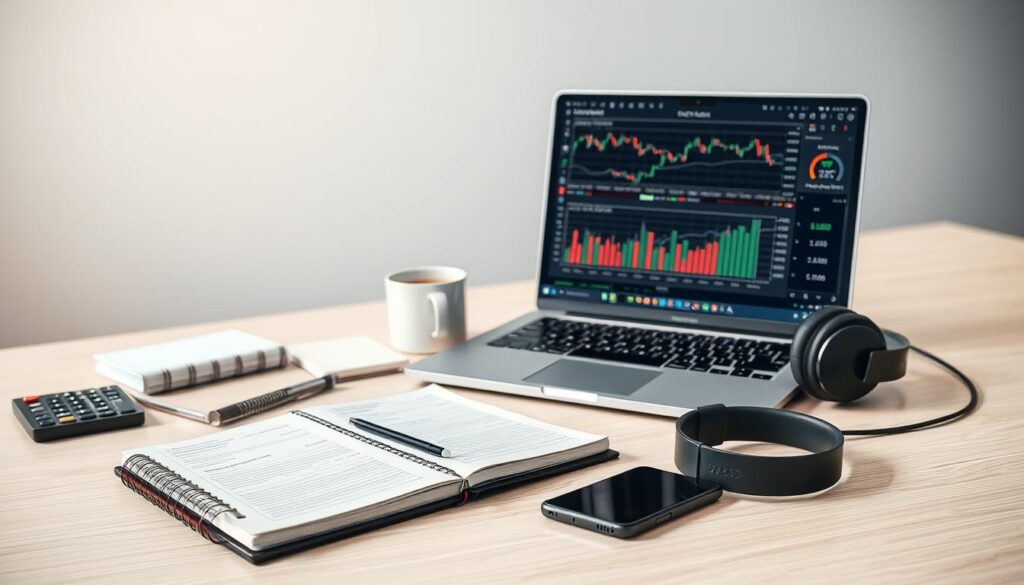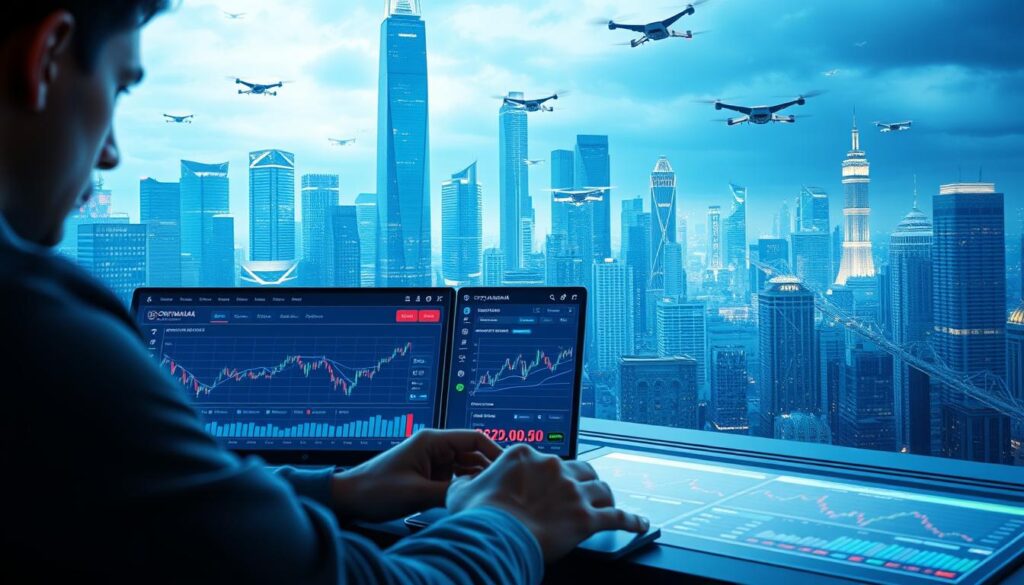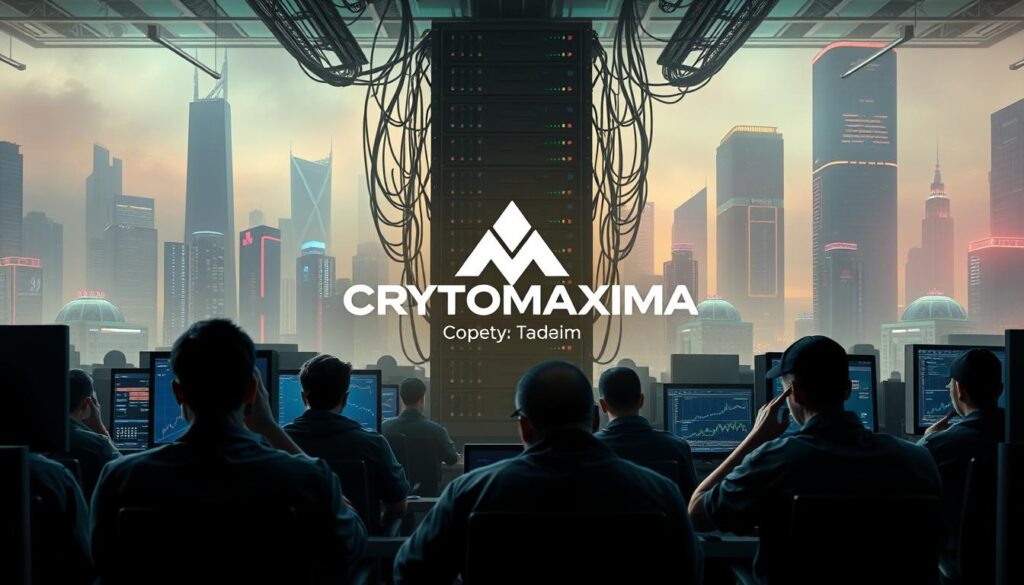In today’s fast-paced financial landscape, automated tools are transforming how traders approach market conditions. These platforms offer precision and efficiency, enabling users to execute strategies with ease. From beginners to seasoned professionals, these tools cater to a wide range of needs.
Platforms like ArbitrageScanner provide access to advanced arbitrage tools, covering over 40 exchanges. Meanwhile, Cryptohopper stands out with its user-friendly interface and support for multiple assets. For those testing the waters, StockHero offers a basic tier to explore automated features.
As these tools evolve, they incorporate advanced features like natural language strategy creation and reinforcement learning. While accessibility is a key advantage, it’s essential to balance it with understanding potential limitations. Evaluating factors like security and multi-exchange support ensures you choose the right fit for your goals.
Introduction to AI Crypto Trading Bots
The rise of automated systems has revolutionized how traders interact with financial markets. These tools, known as trading bots, use advanced algorithms to execute trades efficiently. They are designed to analyze vast amounts of data, identify patterns, and make decisions without human intervention.
What Are AI Crypto Trading Bots?
Trading bots are software programs that automate the process of buying and selling assets. They rely on machine learning models to analyze historical and real-time data. By connecting to exchanges like Binance and Coinbase via APIs, these bots can execute trades seamlessly.
Key components of these systems include:
- Machine learning models for predictive analysis
- Exchange APIs for real-time connectivity
- Customizable risk parameters to align with user preferences
How Do AI Crypto Trading Bots Work?
The workflow of a trading bot involves three main steps. First, it ingests data from various sources. Next, it identifies patterns and trends using algorithms. Finally, it executes trades based on predefined strategies.
For example, platforms like 3Commas use SmartTrade terminals to perform cross-exchange arbitrage. This automation eliminates emotional bias, ensuring decisions are based solely on data.
Over time, these systems have evolved from simple rule-based tools to adaptive agents capable of processing on-chain metrics. This evolution has made them indispensable for modern crypto trading.
To learn more about these AI-powered crypto trading platforms, explore our detailed guide.
Benefits of Using AI Crypto Trading Bots
Modern technology is enabling traders to optimize their strategies effortlessly. Automated systems offer unique advantages that cater to both beginners and experienced professionals. These tools are designed to enhance efficiency, reduce risks, and provide insights into market conditions.
24/7 Market Monitoring
One of the standout features of these systems is their ability to operate non-stop. Platforms like TradeSanta capitalize on volatility during off-hours, such as Asian market openings. This ensures that no opportunity is missed, regardless of time zones.
For example, ArbitrageScanner users have reported monthly earnings of 15-50% through spot-futures arbitrage. This continuous operation allows traders to stay ahead in dynamic market conditions.
Emotion-Free Trading
Human emotions like fear and greed can often lead to poor decisions. Automated tools eliminate this issue by executing trades based on predefined strategies. Trojan Bot’s automated limit orders are a prime example of this approach.
By removing emotional bias, these systems ensure that decisions are driven solely by data and algorithms. This leads to more consistent and reliable outcomes.
Advanced Market Analysis
These tools go beyond basic analysis by incorporating AI-driven insights. TrendSpider bots, for instance, use real-time data to perform technical analysis. They also analyze on-chain metrics like wallet movements to identify trends.
Risk mitigation is another key benefit. Features like automated stop-loss and take-profit triggers, as seen in Kryll’s Strategy Builder, help manage risk effectively. This ensures that traders can focus on their strategies without worrying about unexpected losses.
To explore more about how these platforms are transforming the industry, check out our guide on AI in crypto trading.
Top Features to Look for in AI Crypto Trading Bots
Automated platforms are reshaping how traders interact with dynamic markets. These trading tools come packed with advanced features designed to enhance efficiency and reduce risks. Understanding the key elements can help you choose the right platform for your needs.
Customizable Strategies
One of the standout features is the ability to tailor strategies to your preferences. Platforms like Freqtrade offer open-source code for complete customization, while 3Commas provides pre-built bots for dollar-cost averaging and grid trading. TrendSpider takes it a step further with natural language strategy creation, making it accessible even for beginners.
Real-Time Data Processing
Speed is critical in trading, and low-latency data feeds are essential. ArbitrageScanner, for instance, refreshes signals every two seconds, ensuring you never miss an opportunity. Photon Sol updates charts 5-10 seconds faster than competitors, giving you an edge in fast-moving markets.
Risk Management Tools
Effective risk management is a cornerstone of successful trading. Kryll’s Smartfolio helps diversify portfolios, while its volatility-adjusted position sizing minimizes exposure. Cryptohopper’s historical simulations allow for thorough backtesting, reducing risks before live trading. These tools ensure your performance remains consistent even in unpredictable conditions.
Multi-exchange compatibility is another critical factor. Platforms like Bitsgap support major exchanges such as Binance, Kraken, and Coinbase, providing flexibility and broader market access. By focusing on these features, you can maximize the potential of your trading tools.
Best Free AI Crypto Trading Bots in 2025
The evolution of automated systems has opened new doors for traders seeking efficiency. Several platforms stand out for their unique features and accessibility. Below, we explore three popular trading bots that cater to different needs and skill levels.
ArbitrageScanner: Advanced On-Chain Analysis
ArbitrageScanner offers a free trial that includes DEX/CEX arbitrage signals and wallet analytics. Its private community access provides users with valuable insights. This platform excels in on-chain analysis, making it ideal for those who prioritize data-driven decisions.
Cryptohopper: Strategy Experimentation Made Easy
Cryptohopper’s free tier includes backtesting, basic alerts, and social trading features. Its interface is user-friendly, making it suitable for beginners. This tool is perfect for those looking to experiment with different strategies without significant upfront costs.
StockHero: Affordable Automation
StockHero’s Lite plan, priced at $29.99, allows one active bot with API connectivity to Webull and Robinhood. While it lacks advanced AI, it provides a cost-effective option for users seeking basic automation. Its simplicity makes it a great starting point for newcomers.
Each platform has its strengths and limitations. ArbitrageScanner is ideal for detailed on-chain analysis, while Cryptohopper suits those focused on strategy experimentation. StockHero offers an affordable entry point for basic automation. Understanding these differences helps you choose the right tool for your needs.
Comparing Free vs. Paid AI Crypto Trading Bots
Choosing between free and paid automated systems can significantly impact your trading experience. Each option has its own strengths and weaknesses, making it essential to understand which aligns with your goals.
Pros and Cons of Free Systems
Free platforms like Freqtrade offer transparency through open-source code, allowing users to customize their strategies. This is ideal for those who want full control over their tools. However, free systems often come with limitations, such as scalability issues or the need for technical expertise to set up and maintain them.
For example, Gekko requires Node.js knowledge, which may not suit beginners. Additionally, free systems typically lack advanced features like cloud hosting or priority support, which can be crucial for managing risk effectively.
Pros and Cons of Paid Systems
Paid platforms like 3Commas and TrendSpider provide advanced features such as SmartTrade terminals and multi-bot capacity. These tools are designed for scalability and efficiency, making them suitable for experienced traders. Enhanced plans often include cloud hosting and priority support, ensuring smoother operations.
However, the cost of a subscription can be a barrier for some users. For instance, Kryll’s Professional tier costs $99/month, while StockHero’s rented strategies are priced at $499/year. Despite the expense, paid systems offer robust features that can justify the investment for serious traders.
Ultimately, the choice between free and paid systems depends on your needs. Free platforms are great for testing and learning, while paid tools provide the advanced capabilities required for professional trading. A hybrid approach, such as using free systems for initial testing before upgrading, can also be a smart strategy.
How to Choose the Right AI Crypto Trading Bot for You
Selecting the right automated system can make a significant difference in your trading outcomes. With so many options available, it’s essential to focus on your specific needs and goals. This guide will help you assess your requirements and evaluate the features that matter most.

Assessing Your Trading Needs
Start by identifying your goals. Are you focused on arbitrage, like ArbitrageScanner, or portfolio management, such as Kryll’s Smartfolio? Your objectives will determine the type of system that suits you best.
Consider your technical skills. Some platforms, like Freqtrade, require coding knowledge, while others, such as Photon Sol, offer one-click trading. Choose a system that aligns with your expertise.
Finally, think about your risk tolerance. Systems with advanced risk management tools, like automated stop-loss triggers, can help protect your investments.
Evaluating Bot Features
Create a checklist of essential features. Look for multi-exchange support, leverage options, and tax reporting tools. These elements can enhance your performance and simplify your experience.
Test the system before committing. Platforms like Cryptohopper offer paper trading, while StockHero provides a virtual $2,000 account for demo testing. This allows you to evaluate the system’s performance without financial risk.
Research community feedback. Check reviews on platforms like Reddit or Trustpilot to avoid scams and ensure the system meets your expectations. This step is crucial for a positive user experience.
By following these steps, you can choose a system that aligns with your strategies and enhances your trading tools. For more insights, explore our guide on how to open a demo account.
Setting Up Your First AI Crypto Trading Bot
Setting up your first automated trading system requires careful planning and attention to detail. A well-configured trading bot can enhance your performance, but overlooking key steps can lead to costly mistakes. Below, we break down the process and highlight common pitfalls to avoid.
Step-by-Step Guide
Start by selecting a reliable exchange like Binance or Coinbase. Enable API keys with restricted permissions to ensure security. This limits the bot’s access to only essential functions, reducing risks.
Next, configure your bot’s parameters. Set stop-loss and take-profit levels based on your risk tolerance. Platforms like Cryptohopper allow you to backtest strategies before live deployment, ensuring your setup aligns with your goals.
Finally, integrate your bot with communication tools like Telegram for real-time alerts. Trojan Bot’s Telegram integration is a great example of how this can streamline monitoring.
Common Pitfalls to Avoid
- Overleveraging: Avoid using excessive margin without understanding the requirements. This can lead to significant losses.
- Neglecting updates: Regularly update your bot to ensure compatibility with platform upgrades, such as Solana’s network changes.
- Ignoring security: Always prioritize security by using platforms like TrendSpider, which enforce strict API key protocols.
By following these steps and avoiding common mistakes, you can set up your trading bot for success. Proper setup ensures smoother operations and better results.
Maximizing Profits with AI Crypto Trading Bots
Effective use of automated systems can significantly boost your financial outcomes. By optimizing settings and monitoring performance, you can enhance your trading results. This section explores actionable steps to maximize your returns while minimizing risks.
Optimizing Bot Settings
Customizing your bot’s settings is crucial for success. Platforms like 3Commas offer trailing features that lock in profits during volatile market conditions. Adjust your strategies based on real-time data to stay ahead of trends.
For example, during Bitcoin halving events, dynamic adjustments can help you capitalize on price fluctuations. Use tools like Photon Sol’s real-time dashboards to track market movements and refine your approach.
Monitoring Bot Performance
Regularly evaluating your bot’s performance ensures it aligns with your goals. Metrics like ROI, Sharpe ratio, and drawdown analysis provide valuable insights. Kryll’s reporting tools simplify this process, helping you make informed decisions.
Set up notifications via Telegram or SMS to stay updated on critical events, such as liquidation risks. This proactive approach minimizes potential losses and keeps you in control.
Rebalancing your portfolio is another effective strategy. Use TrendSpider’s scanners to shift capital between assets like ETH and BTC, ensuring optimal allocation.
Case Study: An ArbitrageScanner user earned $6,000 on NOT coin by making timely adjustments based on market analysis. This highlights the importance of staying agile and responsive.
Security Considerations for AI Crypto Trading Bots
Ensuring the safety of your automated trading setup is crucial for long-term success. With the increasing reliance on tools for market analysis and execution, prioritizing security is non-negotiable. This section explores key measures to protect your assets and data.

Protecting Your API Keys
API keys are the gateway between your trading platform and automated systems. To minimize risk, use read-only keys and enable IP whitelisting. For example, Coinbase Pro allows users to restrict permissions, ensuring your funds remain secure.
Rotate your keys monthly and avoid storing them in plain text. Platforms like Cryptohopper use enterprise-grade encryption, including SSL/TLS protocols, to safeguard your credentials. These practices are essential for effective management of your trading tools.
Ensuring Data Privacy
Data privacy is another critical aspect of security. Choose platforms that comply with GDPR and avoid sharing user data with third parties. Regularly monitor audit trails to detect unauthorized trades or suspicious activity.
Integrate cold storage solutions to keep most of your assets offline. This ensures that only exchange-held funds are accessible to your trading tools. By implementing these measures, you can trade with confidence and peace of mind.
Future Trends in AI Crypto Trading Bots
The future of automated trading is being shaped by cutting-edge technologies and innovative approaches. As algorithms become more advanced, these systems are evolving to meet the demands of a rapidly changing market. From quantum computing to decentralized governance, the next few years will bring significant shifts in how traders interact with these tools.
Emerging Technologies
One of the most exciting developments is the integration of quantum computing. This technology enables microsecond arbitrage, allowing traders to capitalize on price discrepancies faster than ever before. Additionally, AI-driven systems are now being used to track NFT floor prices, providing valuable insights for those involved in digital assets.
Another trend is the rise of automation in regulatory compliance. KYC-integrated bots are becoming essential for compliant DeFi trading, ensuring that users adhere to legal requirements while maintaining efficiency.
Predictions for 2025 and Beyond
By 2026, it’s predicted that automated systems will manage 40% of all trading volume. This growth is driven by the increasing adoption of learning-based models, such as reinforcement learning, which adapt to market conditions in real-time.
Voice-controlled bots, powered by integrations like ChatGPT, are also on the horizon. These systems will allow users to execute trades and monitor performance using simple voice commands, enhancing the user experience.
Decentralized bots operating via DAO governance are another emerging trend. These fully on-chain agents offer transparency and community-driven decision-making, aligning with the ethos of blockchain technology.
As these trends continue to evolve, traders must stay informed to leverage the full potential of these advanced tools. The future of trading is not just about data and algorithms—it’s about innovation and adaptability.
User Experiences with AI Crypto Trading Bots
Real-world experiences with automated trading systems offer valuable insights for users. From significant profits to costly mistakes, these stories highlight the importance of strategy, adaptability, and risk management. Below, we explore both success stories and lessons learned to help you navigate your own journey.
Success Stories
Many traders have achieved impressive results using automated systems. For example, an ArbitrageScanner user profited $450 in just two trades by leveraging spot-futures arbitrage. Another success story involves a 3Commas user who achieved 22% monthly returns during bear markets using dollar-cost averaging bots.
These examples demonstrate how the right strategies and tools can lead to consistent performance. By analyzing market trends and adjusting parameters, these users maximized their gains while minimizing risk.
Lessons Learned
Not all experiences are positive. A StockHero renter lost $1,000 by relying on an untested strategy during volatile market conditions. This highlights the importance of thorough backtesting and manual oversight, even when using automated tools.
Community insights, such as those from Reddit threads, emphasize the need for adaptability. Winners often adjust their strategies quarterly, while losers tend to “set and forget.” Additionally, bot-generated trades require detailed records for IRS compliance, a lesson many learn the hard way.
- Success: 3Commas user achieved 22% monthly returns via DCA bots during bear markets.
- Failure: Over-reliance on predictions during Black Swan events (FTX collapse).
- Community Insights: Reddit threads emphasize manual oversight despite automation.
- Tax Lessons: Bot-generated trades require detailed records for IRS compliance.
- Adaptability: Winners adjust strategies quarterly; losers “set and forget.”
By learning from these experiences, you can refine your approach and make the most of automated trading systems. Whether you’re a beginner or an experienced trader, these insights can help you avoid common pitfalls and achieve better results.
Common Misconceptions About AI Crypto Trading Bots
Many traders hold misconceptions about automated trading systems, often leading to unrealistic expectations. These myths can prevent users from leveraging the full potential of these tools. By separating fact from fiction, you can make informed decisions and optimize your trading experience.

Myth vs. Reality
One common myth is that trading bots guarantee profits. In reality, 60% of strategies fail in live markets, according to Token Metrics. These tools rely on algorithms and data, but success depends on proper strategy tuning and market conditions.
Another misconception is that all bots are scams. While fraudulent platforms exist, legitimate tools like ArbitrageScanner offer transparent pricing and proven results. Always verify a platform’s reputation before investing.
Debunking Popular Myths
Some believe that automation replaces human traders entirely. In truth, bots augment decision-making but require oversight. Traders must monitor performance and adjust strategies to stay ahead.
Historical data is often seen as a reliable predictor of future performance. However, Bitcoin’s volatility in 2021 versus 2023 shows that clean data doesn’t always translate to success. Ethical concerns, such as bots accused of wash trading, further highlight the need for careful platform selection.
- Myth: Bots guarantee profits → Reality: Success depends on strategy and market conditions.
- Myth: All bots are scams → Reality: Legitimate tools exist with transparent practices.
- Myth: Automation replaces human traders → Reality: Bots assist but require oversight.
- Data Fallacy: Historical data ≠ future performance.
- Ethical Concerns: Verify platform reputations to avoid unethical practices.
By understanding these misconceptions, you can approach automated trading with realistic expectations and a clear strategy. This ensures you maximize the benefits while minimizing risk.
Getting Started with AI Crypto Trading Bots Today
Starting your journey with automated systems can seem daunting, but with the right approach, it becomes manageable. Begin by educating yourself through resources like Token Metrics’ tutorials or Kryll’s strategy library. This foundational knowledge will help you understand the basics and build confidence.
Next, practice with paper trading. Platforms like StockHero offer demo accounts, allowing you to test strategies without risking real capital. This step is crucial for refining your approach and gaining hands-on experience.
Once you’re comfortable, allocate a small portion of your portfolio—5-10%—to live trading. This minimizes risk while letting you evaluate the platform’s performance. A recommended progression is to start with basic tools, move to paid options, and eventually explore custom-coded solutions.
Finally, join communities on Discord or Telegram for real-time support and updates. Engaging with other users can provide valuable insights and help you stay ahead in dynamic markets. By following these steps, you’ll be well-prepared to navigate the world of automated systems effectively.
FAQ
What are AI crypto trading bots?
These are automated tools that use artificial intelligence to execute trades in cryptocurrency markets. They analyze data, monitor trends, and make decisions without human intervention.
How do AI crypto trading bots work?
They use algorithms to process real-time market data, identify patterns, and execute trades based on predefined strategies. This allows for quick and efficient decision-making.
What are the benefits of using AI crypto trading bots?
They offer 24/7 market monitoring, eliminate emotional trading, and provide advanced analysis to improve decision-making and performance.
What features should I look for in an AI crypto trading bot?
Key features include customizable strategies, real-time data processing, and robust risk management tools to ensure optimal performance.
How do free AI crypto trading bots compare to paid ones?
Free bots are great for beginners but may lack advanced features. Paid bots often offer more customization, better support, and enhanced performance.
How do I choose the right AI crypto trading bot for my needs?
Assess your trading goals, evaluate bot features, and consider factors like ease of use, security, and support to find the best fit.
What are some common pitfalls to avoid when setting up a bot?
Avoid over-reliance on default settings, neglecting risk management, and failing to monitor performance regularly.
How can I maximize profits with an AI crypto trading bot?
Optimize bot settings, regularly review performance, and stay updated on market trends to ensure your strategy remains effective.
What security measures should I take when using a bot?
Protect your API keys, enable two-factor authentication, and choose platforms with strong data privacy policies to safeguard your assets.
What are the future trends in AI crypto trading bots?
Emerging technologies like machine learning and improved algorithms are expected to enhance bot capabilities, making them more efficient and accessible.
Are there any misconceptions about AI crypto trading bots?
Yes, many believe bots guarantee profits or require no oversight. In reality, they are tools that require proper setup and monitoring for success.


No comments yet